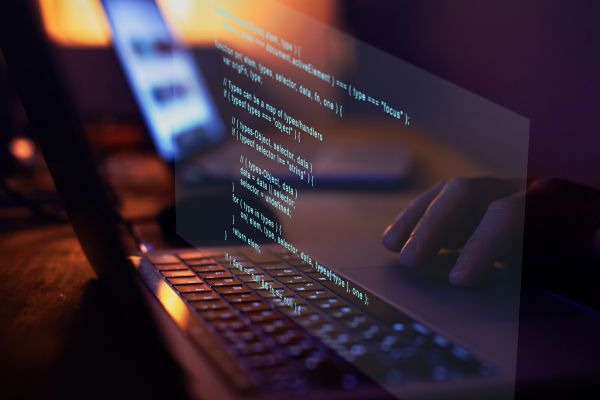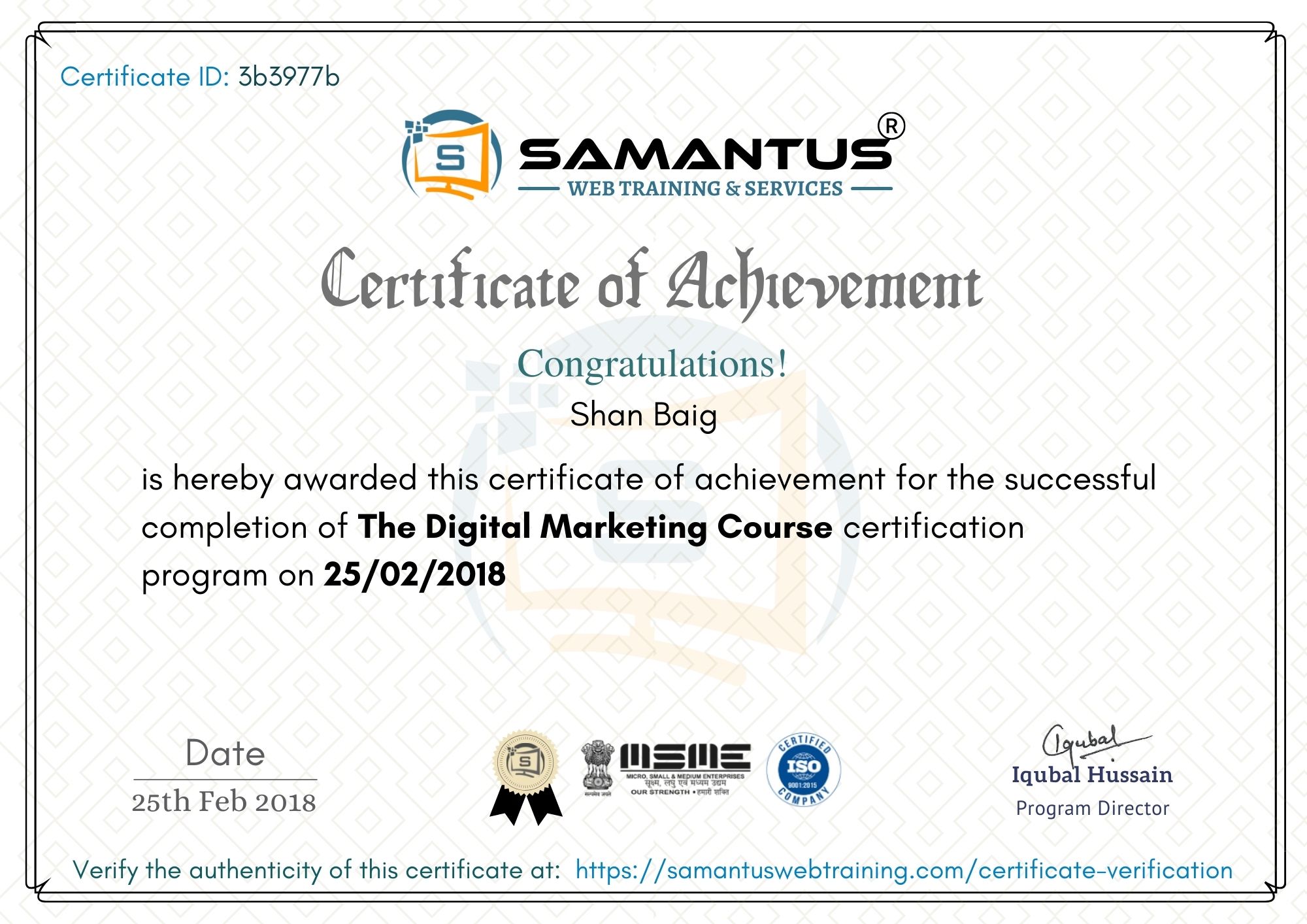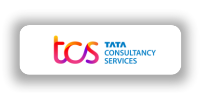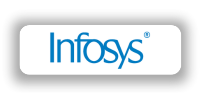Best Java Programming Course in Kerala
A Whole Guide to Java Programming Course: Learn skills that are in demand and become equipped for work in Kerala.

What you'll learn
Java, a highly versatile and in-demand programming language, unlocks a gateway to various exciting applications and career paths. Our comprehensive Java Programming Course empowers you to master Java, from fundamental concepts to advanced programming techniques.
Whats Material Includes?
- Introduction to Programming and Java
- Building Blocks of Java
- Control Flow Statements in Java
- Functions in Java
- Introduction to Object-Oriented Programming (OOP)
- Working with Arrays in Java
- Exception Handling
- Introduction to Java Collections Framework (Optional):
- Working with Files and I/O in Java (Optional):
- Inheritance and Polymorphism
- Project-Based Learning and Portfolio Building

Complete a Java Programming Course with Samantus
- Live Project
- 95% Practical
- 100% Placement help

Get a Certificate in Java Programming Course in Kerala
Unlock Your Potential: Get Your Java Programming Course Certificate Today

Award winning

Make your Career
Course Curriculam
Introduction to Programming and Java
Module 1: Introduction to Programming Concepts
- Overview of programming: understanding algorithms, data structures, and problem-solving techniques
- Introduction to programming languages and their role in software development
Module 2: Introduction to the Java Programming Language
- Java Overview: history, features, and benefits of using Java for software development
- Understanding the Java Virtual Machine (JVM) and platform independence
Module 3: Setting Up a Java Development Environment
- Installing the Java Development Kit (JDK) and Integrated Development Environment (IDE)
- Configuring the IDE for Java development: setting up project structure and environment variables
Module 4: Java Syntax and Basic Constructs
- Understanding Java syntax: variables, data types, and operators
- Exploring basic control structures: conditionals (if-else) and loops (for, while)
Module 5: Object-Oriented Programming (OOP) Concepts
- Introduction to object-oriented programming principles: encapsulation, inheritance, and polymorphism
- Defining classes and objects in Java: attributes, methods, and constructors
Module 6: Working with Classes and Objects
- Creating and using classes and objects in Java programs
- Implementing constructors, methods, and instance variables
Module 7: Understanding Inheritance and Polymorphism
- Exploring inheritance hierarchy: superclass, subclass, and method overriding
- Understanding polymorphism and dynamic method dispatch in Java
Module 8: Introduction to the Java Standard Library (Java API)
- Overview of the Java Standard Library: commonly used classes and packages
- Exploring built-in classes for input/output, string manipulation, and data structures
Module 9: Exception Handling
- Handling exceptions and errors in Java programs: try-catch blocks, finally blocks, and throwing exceptions
- Best practices for exception handling and error management
Module 10: Introduction to the Java Collections Framework
- Overview of the Java Collections Framework: lists, sets, maps, and queues
- Working with collection classes and data manipulation interfaces
Module 11: Java File Handling
- Reading from and writing to files in Java programs: FileReader, FileWriter, FileInputStream, and FileOutputStream
- Managing file input and output streams, as well as handling file operations
Module 12: Project-Based Learning
- Applying Java programming skills to real-world projects: developing console-based applications, simple games, and utility programs
- To reinforce learning and demonstrate proficiency, complete hands-on exercises and projects.
This course curriculum provides a comprehensive introduction to programming and Java, covering basic to intermediate programming concepts, Java syntax, object-oriented programming principles, and practical skills for Java application development.
Building Blocks of Java
Module 1: Introduction to Java Programming
- Overview of Java: history, features, and applications
- Understanding the Java Virtual Machine (JVM) and platform independence
Module 2: Setting Up a Java Development Environment
- Installing the Java Development Kit (JDK) and Integrated Development Environment (IDE)
- Configuring the IDE for Java development: setting up project structure and environment variables
Module 3: Java Syntax and Basic Constructs
- Understanding Java syntax: variables, data types, and operators
- Exploring basic control structures: conditionals (if-else) and loops (for, while)
Module 4: Working with Methods and Functions
- Defining and calling methods in Java programs
- Understanding method parameters, return types, and method overloading.
Module 5: Object-Oriented Programming (OOP) Concepts
- Introduction to object-oriented programming principles: encapsulation, inheritance, and polymorphism
- Defining classes and objects in Java: attributes, methods, and constructors
Module 6: Java Classes and Objects
- Creating and using classes and objects in Java programs
- Implementing constructors, methods, and instance variables
Module 7: Understanding Inheritance and Polymorphism
- Exploring inheritance hierarchy: superclass, subclass, and method overriding
- Understanding polymorphism and dynamic method dispatch in Java
Module 8: Introduction to the Java Standard Library (Java API)
- Overview of the Java Standard Library: commonly used classes and packages
- Exploring built-in classes for input/output, string manipulation, and data structures
Module 9: Exception Handling in Java
- Handling exceptions and errors in Java programs: try-catch blocks, finally blocks, and throwing exceptions
- Best practices for exception handling and error management
Module 10: Arrays and Collections in Java
- Working with single-dimensional and multi-dimensional arrays
- Introduction to the Java Collections Framework: Lists, Sets, Maps, and Queues
Module 11: Java File Handling
- Reading from and writing to files in Java programs: FileReader, FileWriter, FileInputStream, and FileOutputStream
- Managing file input and output streams, as well as handling file operations
Module 12: Project-Based Learning
- Applying Java programming skills to real-world projects: developing console-based applications, simple games, and utility programs
- To reinforce learning and demonstrate proficiency, complete hands-on exercises and projects.
Control Flow Statements in Java
- Learn how to control the program flow using if-else statements, switch statements, and loops (while, for loops) to create dynamic and interactive programs.
Functions in Java
Module 1: Introduction to Functions
- Understanding the concept of functions in programming
- Exploring the benefits of using functions for code organization and reusability
Module 2: Defining and Calling Functions
- Syntax for defining functions in Java: return type, function name, parameters, and body
- Calling functions with different argument types and return values
Module 3: Function Parameters and Return Types
- Working with function parameters: passing arguments by value and by reference
- Understanding different return types: void, primitive types, and object types
Module 4: Method Overloading
- Understanding method overloading: defining multiple functions with the same name but different parameter lists
- Parameter matching is used to resolve overloaded method calls.
Module 5: Variable scope and lifetime
- Understanding variable scope: Local variables, parameters, and class variables
- Exploring variable lifetime: understanding the duration of variable existence within a function
Module 6: Recursion
- Introduction to recursion: defining functions that call themselves to solve problems
- Understanding base and recursive cases in recursive functions
Module 7: Passing Functions as Parameters (Optional)
- Exploring higher-order functions: passing functions as arguments to other functions
- Implementing function callbacks and functional interfaces
Module 8: Lambdas and Functional Programming (Optional)
- Introduction to lambda expressions: concise syntax for defining anonymous functions
- Exploring functional programming concepts: streams, map-reduce, and filter operations
Module 9: Exception Handling in Functions
- Exception handling within functions: try-catch blocks and throwing exceptions
- Best practices for error handling and graceful function termination
Module 10: Advanced Functional Concepts
- Exploring advanced function concepts: method references, default methods, and static methods in interfaces
- Understanding function annotations and metadata
Module 11: Project-Based Learning
- Applying function concepts to real-world programming scenarios: designing modular code, implementing algorithms, and solving problems
- To reinforce learning and demonstrate proficiency, complete hands-on exercises and projects.
This course curriculum comprehensively explores Java functions, covering everything from basic to advanced concepts, function syntax, parameter passing, recursion, and optional topics such as passing functions as parameters and functional programming.
Introduction to Object-Oriented Programming (OOP)
- Explore the fundamental principles of OOP: classes, objects, and their relationships.
- Understand how OOP promotes code reusability, maintainability, and modularity.
Working with Arrays in Java
Module 1: Introduction to Arrays
- Understanding arrays as data structures for storing multiple elements of the same type
- Exploring the benefits and limitations of using arrays in Java
Module 2: Array Declaration and Initialization
- Syntax for declaring arrays in Java: specifying the data type and array size
- Initializing arrays with default values or specific elements
Module 3: Accessing Array Elements
- Accessing individual elements of an array using index notation
- Understanding array indexing: zero-based indexing and array bounds
Module 4: Modifying array elements
- Updating array elements: assigning new values to specific positions in the array
- Understanding array mutability and immutability.
Module 5: Array Length and Properties
- Accessing array length: using the length property to determine the size of an array
- Exploring array properties: capacity, size, and memory allocation
Module 6: Iterating Through Arrays
- Using loops to iterate through array elements: for loop, enhanced for loop, and while loop
- Performing array traversal: accessing and processing each element in the array
Module 7: Multidimensional Arrays
- Understanding multidimensional arrays: arrays of arrays
- Declaring, initializing, and accessing elements in two-dimensional arrays
Module 8: Array Manipulation Methods
- Using array manipulation methods from the Arrays class: sorting, searching, and copying arrays
- Exploring utility methods for array manipulation and transformation
Module 9: Passing Arrays to Methods
- Passing arrays as method arguments: passing arrays by reference
- The process involves modifying array elements within methods and returning arrays from those methods.
Module 10: Working with Arrays of Objects
- Creating arrays of objects: storing object references in arrays
- Object properties within arrays can be accessed and manipulated.
Module 11: Common Array Operations and Patterns
- Implementing common array operations: finding minimum and maximum values, calculating averages, and summing elements
- Exploring common array patterns: linear search, binary search, and array reversal
Module 12: Project-Based Learning
- Applying array concepts to real-world programming scenarios: implementing algorithms, solving problems, and processing data
- To reinforce learning and demonstrate proficiency, complete hands-on exercises and projects.
This course curriculum provides a comprehensive exploration of working with arrays in Java, covering basic to advanced array concepts, manipulation techniques, multidimensional arrays, and practical skills for array-based programming.
Inheritance and Polymorphism
- Delve deeper into OOP with inheritance, allowing code reusability through creating hierarchical relationships between classes.
- Explore polymorphism, a core OOP concept enabling objects to respond differently to the same message.
Exception Handling
- Grasp how to handle exceptions, errors that occur during program execution, to make your Java programs more robust and user-friendly.
Introduction to Java Collections Framework (Optional):
- Explore the Java Collections Framework (JCF), a rich library of pre-written data structures (like ArrayList and HashMap) and algorithms (sorting and searching) to streamline your Java development process. (May vary depending on course content.).
Working with Files and I/O in Java (Optional):
- Learn how to read data from files and write data to files, enabling your Java programs to interact with external data sources. (May vary depending on course content).
Project-Based Learning and Portfolio Building
Throughout the course, you’ll have ample opportunities to apply your learned concepts through engaging projects. These projects will challenge you to design, write, and test Java programs, solidifying your understanding and preparing you for real-world programming scenarios. By the course’s conclusion, you’ll have a portfolio of projects showcasing your Java programming skills and problem-solving abilities.
By enrolling in our Java
Companies That Hire
(Freshers & Experienced Required As Per Company Norms)










